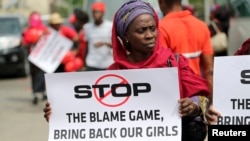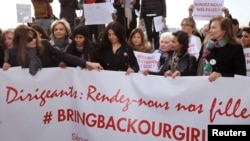PENTAGON —
Meanwhile, Amnesty International says Nigerian security forces had advance warning about the raid on the girls boarding school.
The human rights group says security forces failed to act on warnings that began coming in more than four hours before Boko Haram fighters attacked the school in the town of Chibok on April 14.
The rights group blamed the lack of action on an "inability to muster troops," due to poor resources and a possible fear of engaging with the often better-armed militants.
Amnesty said Friday that it learned of the warnings from local officials and two senior military officers. There was no immediate reaction from the Nigerian government.
The U.N. Security Council Friday expressed its outrage at the abductions. It welcomed efforts by the international community to provide assistance to Nigeria to find the girls. Speaking on behalf of the council, South Korean Ambassador Oh Joon said the council will consider taking measures against Boko Haram.
"The members of the Security Council expressed their intention to actively follow the situation of the abducted girls and to consider appropriate measures against Boko Haram," said Joon.
Time running out
The Pentagon says most of its team has arrived in Nigeria to assist in the search for the nearly 300 schoolgirls kidnapped by Boko Haram. But officials warn time may be running out.
"In any hostage situation time is at a premium and there's no question we're racing against the clock here," Pentagon spokesman Admiral John Kirby said Friday.
Six experts from the U.S. Africa Command landed in the Nigerian capital Abuja Friday morning, joining 10 U.S. personnel who are already there. They aim to help Nigeria with communications, planning and intelligence analysis in the search for the girls.
"We're not talking about U.S. military operations in Nigeria to find these girls," Kirby specified." That's not the focus here."
No drones planned
Despite concerns time may be running out to locate the missing girls, as of now the U.S. will not be using drones to help in the search, putting the weight on the Nigerian military instead.
Kirby said the U.S. is urging Nigeria to "use all the resources at their disposal" to rescue the girls. He said Washington had previously offered assistance to the Nigerian government but the offer was not accepted until this week.
He said in addition to rescuing the girls held by Boko Haram, the U.S. will also continue working with Nigeria on counter-terrorism.
"The Nigerians are very aware of the threat that Boko Haram poses to them and to their national security," Kirby noted.
Britain has also sent a team to Nigeira to assist in the search, expecting to work closely with the Americans. British officials say in addition to working on a rescue, the team will be looking at ways to help defeat Boko Haram.
Where are the girls?
Speaking on the sidelines of the World Economic Forum for Africa, WEFA, Nigerian President Goodluck Jonathan said he believed the schoolgirls abducted by Islamist militants last month have not been moved to neighboring Cameroon.
"If they move that number of girls to Cameroon, people will see, so I believe they are still in Nigeria,'' Jonathan told journalists.
Jonathan's government has been criticized for its slow response to the hostage crisis since the abductions and it was the first time he spoke about where he thinks the girls are being held.
Former British Prime Minister Gordon Brown, who spoke at the forum, said he empathizes with the parents of the missing girls in their anguish over the possibility that they may be murdered, trafficked or forced to become sex slaves.
Social media protests
For weeks, activists in Nigeria and around the world have been holding rallies demanding the rescue of the girls and sending out Twitter blasts with hashtags like #BringBackOurGirls and #ChibokGirls.
One group promosed to out-tweet the forum's #WEFA hashtag. Their success was partially due however, to the fact that participants and organizers were also tweeting #BringBackOurGirls.
WEFA said in response to the kidnapping, delegates also worked to design programs specifically aimed at helping to secure school children in northern Nigeria.
"We launched a safer-school initiative here," explained Philipp Rosler, managing director of the World Economic Forum. "So the business community said 'OK, we must do something.' And they put together their money - $10 million - the beginning of a special fund to make schools safer."
Some Nigerians are skeptical about whether fancy conferences can actually touch real people's lives.
But forum officials say they are determined to try to solve the disparity problem because it breeds the type of insecurity that allows insurgency to thrive.
Health concerns
Parents and relatives of some of the girls abducted from their Chibok secondary school in northeastern Nigeria are reportedly suffering from a variety of stress-related diseases including heart problems, diabetes and high blood pressure.
A grandfather of three of the abducted girls, Mani Chibok who spoke to VOA's Hausa service, said stress levels shot up when news broke that the girls have been forcibly married to Boko Haram insurgents who took them away.
Mani, who is also a district head, said several other parents have resorted to hunger strikes to increase pressure on authorities to find the missing students.
Another Chibok resident, Shettima Abba, also told VOA Hausa that other parents have been taken to hospitals due to poor health attributed to the abduction of the girls.
VOA"s Heather Murdock contributed to this report from Abuja
The human rights group says security forces failed to act on warnings that began coming in more than four hours before Boko Haram fighters attacked the school in the town of Chibok on April 14.
The rights group blamed the lack of action on an "inability to muster troops," due to poor resources and a possible fear of engaging with the often better-armed militants.
Amnesty said Friday that it learned of the warnings from local officials and two senior military officers. There was no immediate reaction from the Nigerian government.
The U.N. Security Council Friday expressed its outrage at the abductions. It welcomed efforts by the international community to provide assistance to Nigeria to find the girls. Speaking on behalf of the council, South Korean Ambassador Oh Joon said the council will consider taking measures against Boko Haram.
"The members of the Security Council expressed their intention to actively follow the situation of the abducted girls and to consider appropriate measures against Boko Haram," said Joon.
Time running out
The Pentagon says most of its team has arrived in Nigeria to assist in the search for the nearly 300 schoolgirls kidnapped by Boko Haram. But officials warn time may be running out.
"In any hostage situation time is at a premium and there's no question we're racing against the clock here," Pentagon spokesman Admiral John Kirby said Friday.
Six experts from the U.S. Africa Command landed in the Nigerian capital Abuja Friday morning, joining 10 U.S. personnel who are already there. They aim to help Nigeria with communications, planning and intelligence analysis in the search for the girls.
"We're not talking about U.S. military operations in Nigeria to find these girls," Kirby specified." That's not the focus here."
No drones planned
Despite concerns time may be running out to locate the missing girls, as of now the U.S. will not be using drones to help in the search, putting the weight on the Nigerian military instead.
Kirby said the U.S. is urging Nigeria to "use all the resources at their disposal" to rescue the girls. He said Washington had previously offered assistance to the Nigerian government but the offer was not accepted until this week.
He said in addition to rescuing the girls held by Boko Haram, the U.S. will also continue working with Nigeria on counter-terrorism.
"The Nigerians are very aware of the threat that Boko Haram poses to them and to their national security," Kirby noted.
Britain has also sent a team to Nigeira to assist in the search, expecting to work closely with the Americans. British officials say in addition to working on a rescue, the team will be looking at ways to help defeat Boko Haram.
Where are the girls?
Speaking on the sidelines of the World Economic Forum for Africa, WEFA, Nigerian President Goodluck Jonathan said he believed the schoolgirls abducted by Islamist militants last month have not been moved to neighboring Cameroon.
"If they move that number of girls to Cameroon, people will see, so I believe they are still in Nigeria,'' Jonathan told journalists.
Jonathan's government has been criticized for its slow response to the hostage crisis since the abductions and it was the first time he spoke about where he thinks the girls are being held.
Former British Prime Minister Gordon Brown, who spoke at the forum, said he empathizes with the parents of the missing girls in their anguish over the possibility that they may be murdered, trafficked or forced to become sex slaves.
Social media protests
For weeks, activists in Nigeria and around the world have been holding rallies demanding the rescue of the girls and sending out Twitter blasts with hashtags like #BringBackOurGirls and #ChibokGirls.
One group promosed to out-tweet the forum's #WEFA hashtag. Their success was partially due however, to the fact that participants and organizers were also tweeting #BringBackOurGirls.
WEFA said in response to the kidnapping, delegates also worked to design programs specifically aimed at helping to secure school children in northern Nigeria.
"We launched a safer-school initiative here," explained Philipp Rosler, managing director of the World Economic Forum. "So the business community said 'OK, we must do something.' And they put together their money - $10 million - the beginning of a special fund to make schools safer."
Some Nigerians are skeptical about whether fancy conferences can actually touch real people's lives.
But forum officials say they are determined to try to solve the disparity problem because it breeds the type of insecurity that allows insurgency to thrive.
Health concerns
Parents and relatives of some of the girls abducted from their Chibok secondary school in northeastern Nigeria are reportedly suffering from a variety of stress-related diseases including heart problems, diabetes and high blood pressure.
A grandfather of three of the abducted girls, Mani Chibok who spoke to VOA's Hausa service, said stress levels shot up when news broke that the girls have been forcibly married to Boko Haram insurgents who took them away.
Mani, who is also a district head, said several other parents have resorted to hunger strikes to increase pressure on authorities to find the missing students.
Another Chibok resident, Shettima Abba, also told VOA Hausa that other parents have been taken to hospitals due to poor health attributed to the abduction of the girls.
VOA"s Heather Murdock contributed to this report from Abuja





